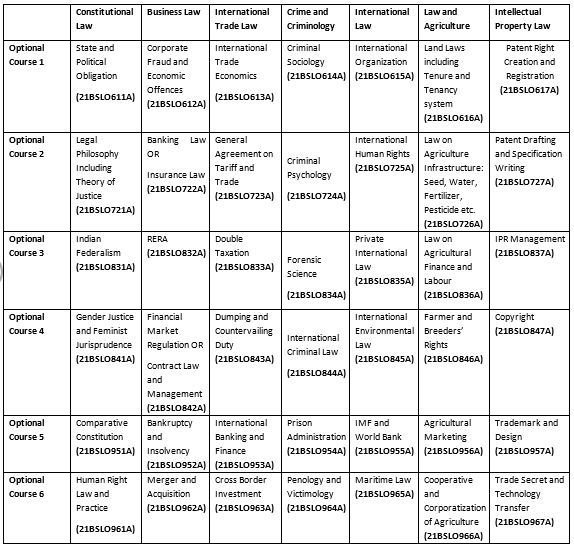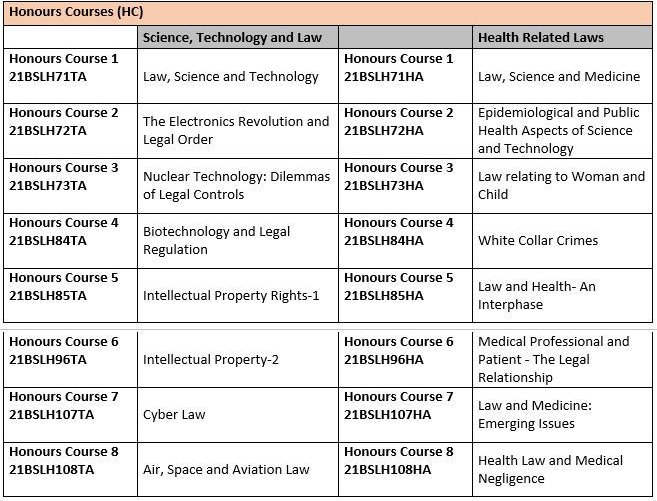B.Sc. LL.B.(Hons.)
On this page
Overview
The connections between law, science, technology and social sciences are ubiquitous increasingly complex in contemporary societies. Symbols of these connections can be seen in road signs, food labels, safety certificates, birth and death certificates, bank cards, medicinal prescriptions, deeds, door security locks, motor vehicle performance tests, public behaviour and its surveillance, and so on. Similar connections can be found in a myriad of more hidden social spaces, such as biochemical laboratories, planning offices, industrial manufacturers, patent offices, crime scenes, law courts, and parliaments. In all these cases, fundamental legally framed social relationships, property ownership, as well as responsibilities, including liability, and rights arising from these. The connections between law, science, technology, and society continually evolve in interaction with each other, and to understand these connections represents a significant academic challenge.
The Ramaiah University of Applied Sciences (RUAS) provides a distinctive and appropriate multidisciplinary and cross-disciplinary knowledge ecosystem to offer such a unique blend of law, science, and technology program.
B.Sc. LL.B.(Hons) is a five year integrated undergraduate program which prepares students for opportunities in the field of science, technology and law. The mode of imparting education as part of this program is through 3D Aspects of Law i.e., Law in Text; Law in context; and Law in Practice by classroom teaching, lab experiments, as well as through case studies, moot courts and client interviews etc. The maximum duration in which candidates need to complete B.Sc. LL.B.(Hons.) programme is eight years.
Objective
The objective of this program is to prepare students for the field of law by imparting integrated knowledge of Science, Technology and Law. The main objective of this programme is to impart knowledge, understanding and cognitive abilities in Law and science related courses. The program is application oriented, interdisciplinary approach, problem solving and outcome driven curriculum. The programme further focuses on research-informed teaching, comprehensive assessment and evaluation, dissemination of legal and scientific knowledge to solve societal problems, development of competencies and practical skills required for effective problem solving and right decision making in different activities relevant to Law. Further the program fosters a culture of socio-legal entrepreneurship. The programme also embeds courses to train students on personal development and interactive skills with a feel for society. The B.Sc. LL.B. (Hons) is of 5 years duration spread over 10 semesters.
Highlights
Proctoral System
Under the Proctoral System, every student is assigned a faculty member as a Proctor or a mentor.
These mentors offer guidance, support and encouragement to students, helping them as they progress along their academic journey. From the choice of electives to their academic performance, from attendances to meeting their credit requirements, students can approach these mentors with any and every query.
Proctors also interact with parents/guardians and keep them updated on the progress of students.
To ensure that they reap the benefits of the Proctoral System, students are advised to be in regular contact with their Proctors.
Industry Visit
Students have to take up at least five an internship in law firms, NGOs, Companies, Firms, research Institutions etc. during the course of five years. It is also necessary for the student to submit an internship report and make a presentation to the members of the panel constituted by the HoD for assessment.
Optional Courses
Students can choose from a multitude of optional courses in the fields of Constitution, Business law, International Trade Law, Crime and Criminology, International Law, Intellectual property Law and others. These are specially designed to help in the holistic development of an individual.
Honour Courses
Students can choose from a multitude of optional courses in the fields of Science and Technology and Health related laws. These are specially designed to help in the holistic development of an individual in the field of science, technology and law.
Compulsory Courses
Students have to complete compulsory clinical courses like ADR (Alternative Dispute resolution), drafting pleading and Conveyance and moot court exercises for the completion of the course. These are compulsory courses as per BCI norms for practical application of law which will help in the holistic development of an individual in the field of law.
Open electives
Students can choose from a multitude of open electives across faculties for credits. These are specially designed as a basic introduction which help in the holistic development of an individual.
Structure
Study Domains
- CC
Compulsory Course
Includes study of all science and law courses as mandated by BCI
- SE
Skill Enhancement Course
Aimed at providing hands-on-training, competencies, skills like Mooting skills, client interviewing, ADR mechanisms, accounting tutorials etc.
- AEC
Ability Enhancement Compulsory Courses
Communication Skills, Elements of Social Sciences and Ethics, Environmental Ethics & laws, Constitutionalism and Human rights jurisprudence
- DSE
Discipline Specific Elective
Deep dive into the core domain of lawyering skills, Finance & Banking law principles, Taxation, Medical jurisprudence and other core areas of laws
- GE
Generic Elective
Students can choose from a list of courses offered across the university form multiple disciplines to enhance their knowledge
Course Progression
| Course | Credits |
|---|---|
Communicative English: Law and Language | 4 |
Legal Methods & Legal Theories | 4 |
Mechanics and Modern Physics | 4 |
General Organic Chemistry | 4 |
Introductory to Biology (Life on Earth) | 4 |
Key
- Theory
- Tutorials
- Practicals
| Course | Credits |
|---|---|
Legal Language and Art of Advocacy / Legal Professional Communication Skills | 4 |
Waves and Optics | 4 |
Inorganic & Biochemistry Chemistry | 4 |
Concepts in Microbiology, Molecular biology, and Genetics | 4 |
Algebra, Geometry and Trigonometry | 4 |
Key
- Theory
- Tutorials
- Practicals
| Course | Credits |
|---|---|
Electromagnetism and electronics | 4 |
Forensic Chemistry | 4 |
Principles of Biology at cellular level | 4 |
Calculus | 4 |
Law of Tort | 4 |
Law of Contract - I | 4 |
Key
- Theory
- Tutorials
- Practicals
| Course | Credits |
|---|---|
Linear Algebra, Statistics and Probability | 4 |
Constitutional Law-I | 4 |
Law of Contract – II | 4 |
Family Law-I | 4 |
Law of Property | 4 |
Administrative Law | 4 |
Key
- Theory
- Tutorials
- Practicals
| Course | Credits |
|---|---|
Constitutional Law-II | 4 |
Family Law-II | 4 |
International Law | 4 |
Labour Law-I | 4 |
Jurisprudence | 4 |
Environmental Law | 4 |
Key
- Theory
- Tutorials
- Practicals
| Course | Credits |
|---|---|
Labour Law-II | 4 |
Criminal Law-I (Law of Crimes/IPC) | 4 |
CPC and Law of Limitation | 4 |
Criminal Law-II (Cr.P.C) | 4 |
Corporate Law | 4 |
Optional Course-I (Elective) | 3 |
Key
- Theory
- Tutorials
- Practicals
| Course | Credits |
|---|---|
Professional Ethics and Professional Accounting Systems | 4 |
Law of Evidence | 4 |
Honours Course-I | 4 |
Honours Course-II | 4 |
Honours Course-III | 4 |
Optional Course-II (Elective) | 3 |
Key
- Theory
- Tutorials
- Practicals
| Course | Credits |
|---|---|
Optional Course-III (Elective) | 3 |
Optional Course-IV (Elective) | 3 |
Alternative Dispute Resolution Systems | 4 |
Honours Course-IV | 4 |
Honours Course-V | 4 |
Principles of Taxation Law | 4 |
Key
- Theory
- Tutorials
- Practicals
| Course | Credits |
|---|---|
Optional Course-V (Elective) | 3 |
Optional Course-VI (Elective) | 3 |
Drafting, Pleading and conveyance | 4 |
Open Elective Course-I | 3 |
Honours Course-VI | 4 |
Key
- Theory
- Tutorials
- Practicals
| Course | Credits |
|---|---|
Moot Court Exercise and Internship | 4 |
Open Elective Course-II | 3 |
Honours Course-VII | 4 |
Honours Course-VIII | 4 |
Key
- Theory
- Tutorials
- Practicals
Details
List of Optional Courses (OS)
List of Honours Courses
Teaching and Assessment
During each semester students’ performance is assessed through continuous evaluation (CE) which includes teacher interaction, session examination, and a Semester End Examination (SEE). CE and SEE weights carry equal weightage.
Students are awarded grades based on the marks scored.
Key Skill Development
- Application oriented
- Interdisciplinary approach
- Problem solving and outcome driven curriculum
- Research-informed teaching
- Comprehensive assessment and evaluation
- Dissemination of legal and scientific knowledge to solve societal problems
- Foster a culture of socio-legal entrepreneurship
The aim is to create an institutional environment that promotes intellectual and practical learning. With unique diversity, the university seeks to create a scholarly community in which students and faculty discuss issues freely in a variety of setting both formal and informal.
Careers
Practice of Law in Bar
Judicial Services
Drug safety Associate
Cyber Forensics specialist
Cyber Forensics specialist
Legal Advisor in Law Firm
Research Fellow/Associates
Non-Governmental Organization
Prosecutors
Law Clerks
Government services
Law officers in PSUs and Private organizations
Corporate Sector
Admissions
Indian Nationals
Eligibility
Eligibility Criteria as per BCI Norms
Candidates who have passed 10+2 examination or equivalent from a recognized Central or State board, shall be eligible for admission to the B.Sc. LL.B. (Hons.) programme provided
- The candidates belonging to General Category should have secured at least 45% of the total marks
- The candidates belonging to OBC Category should have secured at least 42% of the total marks
- The candidates belonging to SC/ST should have secured at least 40% of the total marks
Fees & Scholarships
Refer Fee Structure



